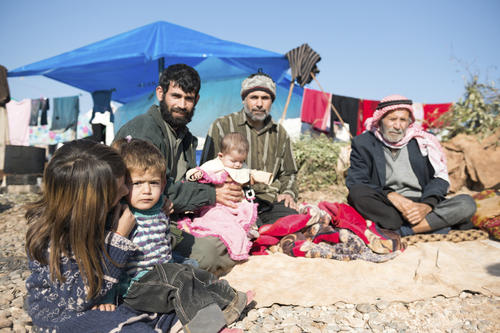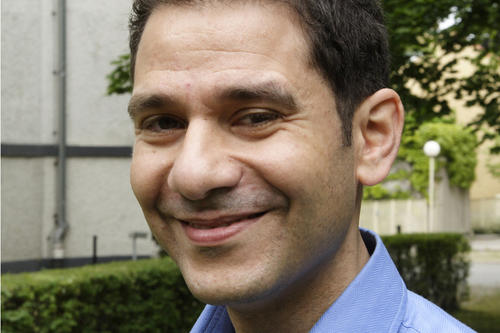“Once the conflict has eased, the real work will start”
Charité physicians train Arab psychologists and psychiatrists in treating traumatized Syrian refugees – an interview with psychiatry professor Malek Bajbouj
Oct 30, 2013
This family in the Atmeh refugee camp in Syria fled from the province of Idlib. Physicians from the Charité Benjamin Franklin Campus set up psychological support for Syrian refugees.
Image Credit: istockphoto/ jcarillet
Psychiatry professor Dr. Marek Bajbouj is in charge of the project "CharitéHelp4Syria."
Image Credit: Bernd Wannenmacher
The Syrian civil war has cost an estimated 100,000 lives or more to date. According to United Nations estimates, there are nearly two million refugees seeking protection in neighboring countries. All of them have had terrible experiences, and many suffer from post-traumatic stress disorder (PTSD). Doctors from Charité – Universitätsmedizin Berlin, the joint medical school of Freie Universität Berlin and Humboldt-Universität, are now scheduled to travel to the Jordanian capital, Amman, to train ten Arabic-speaking psychologists and psychiatrists on how to treat the results of trauma so that they can treat Syrian refugees in Lebanon and Jordan. An interview with Professor Malek Bajbouj of the Department of Psychiatry and Psychotherapy at the Benjamin Franklin Campus, who is in charge of coordinating the “CharitéHelp4Syria” project.
Professor Bajbouj, how is “CharitéHelp4Syria” being implemented?
First we will send a team of experts from Charité to Jordan, where they will spend three weeks giving intensive training in trauma therapy to ten colleagues from Syria, Jordan, and Lebanon. These colleagues will then work in refugee camps and basic medical centers, receiving support from us on two levels. First, our local partners, such as the American University of Beirut, are available to help with day-to-day work in the area, and second, we will schedule weekly videoconferences from here to discuss how things are going with treatment activities, and we will visit the colleagues once a month. The project is receiving about 700,000 euros in funding from the German Federal Foreign Office. It is initially scheduled to run for twelve months.
How do you select the doctors?
We ran ads, and we use academic channels and social networks. Right now we are receiving about ten applications per day, from all over the world. Many come to us from the Middle East, most of them from Lebanon. Ideally, applicants should already have training in psychiatry and psychology. One psychologist who has already spent many years working as a trauma therapist in London is joining the team with outstanding previous training. The team will also include a neurologist who has previously treated strokes, along with some colleagues who have just finished their degrees. Ultimately, everyone will work in a field where he or she can make the most effective use of previous experience. One important thing is that everyone will need to be personally very resilient.
How many refugees do you expect to help this way?
We agreed with the German Federal Foreign Office on a milestone of 2,000 patients within 12 months. That number might sound high at first, but with more than two million refugees, we expect the number of people needing treatment to be in the six digits. At least a third of the refugees will suffer from disorders due to trauma, so the need is huge.
How long will treatment last?
There are different kinds of complications that arise with trauma. The simplest form is sleep disorders, which we can treat very quickly. There are drug-based strategies and clear rules for what to do and when. But there are also highly complex forms of PTSD where treatment can be quite lengthy. With these patients, however, it is possible to significantly reduce symptoms within a year. Still, there will be some cases in which treatment will necessarily take longer.
What can you do for these difficult cases?
We will try to create initial structures. We don’t want to land like a helicopter, kick up some dust, and then disappear again, which is often an issue with these kinds of aid projects. It’s almost like a kind of tourism. I don’t mean to pass judgment; when resources are limited, they flow to where the need is greatest. Ten years ago, it was Iraq, and now it is Syria and the surrounding area. But it’s important to make sure we make a lasting contribution here, and that our work can also be continued. For that reason, the ten colleagues will also include Syrians who receive training to develop trauma centers in Syria. And we hope the colleagues we train will train other colleagues in turn. The real work won’t start until the conflict has eased.
Questions by Mirko Lux
Further Information
Univ.-Prof. Dr. med. Malek Bajbouj, Carité-Universitätsmedizin Berlin (joint medical school of Freie Universität Berlin and Humboldt-Universität zu Berlin), Department of Psychiatry and Psychotherapy at Campus Benjamin Franklin, Tel.: +49 30 8445-8601


